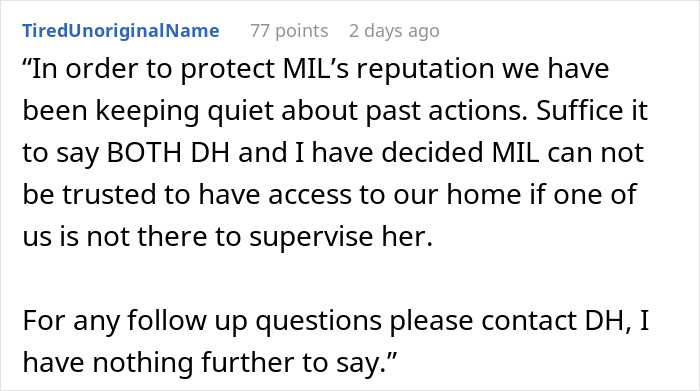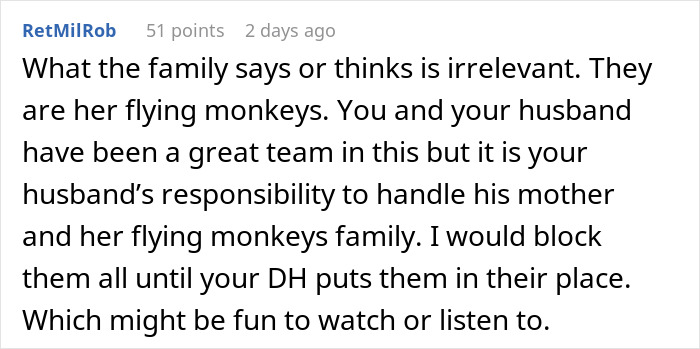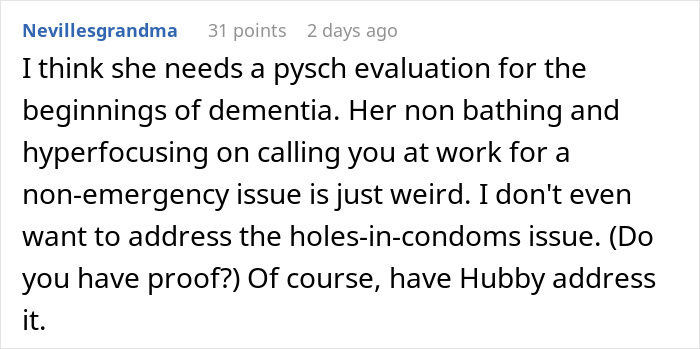Boundaries, boundaries, boundaries! They’re ever so important. Especially when you consider the fact that some people seem to lack common sense when it comes to obvious but sensitive things. Like basic hygiene and people’s privacy, for example.
An anonymous woman, who has a very tense relationship with her mother-in-law, vented to the r/JUSTNOMIL online community and asked for advice regarding an extremely delicate family situation. She revealed that she had to prohibit her MIL from using the pool because she hadn’t showered in weeks. What’s more, she couldn’t be trusted in the house alone without supervision. Read on for the full story and to see what advice various internet users gave the distressed author.
It’s common sense to shower before you go swimming in the pool. Alas, common sense isn’t all that common

An anonymous woman opened up about how she finally called out her mother-in-law, who has serious issues with hygiene and respecting others’ privacy
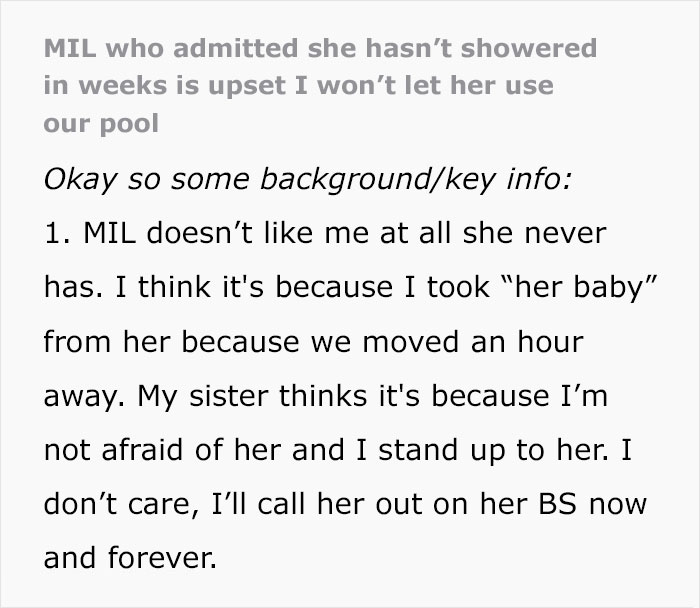




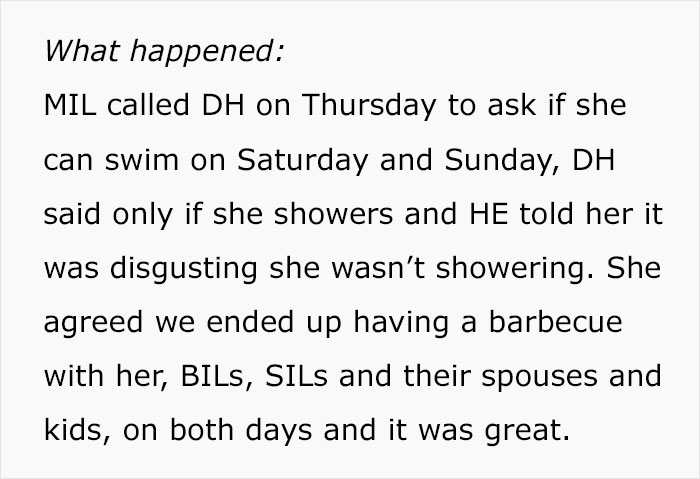
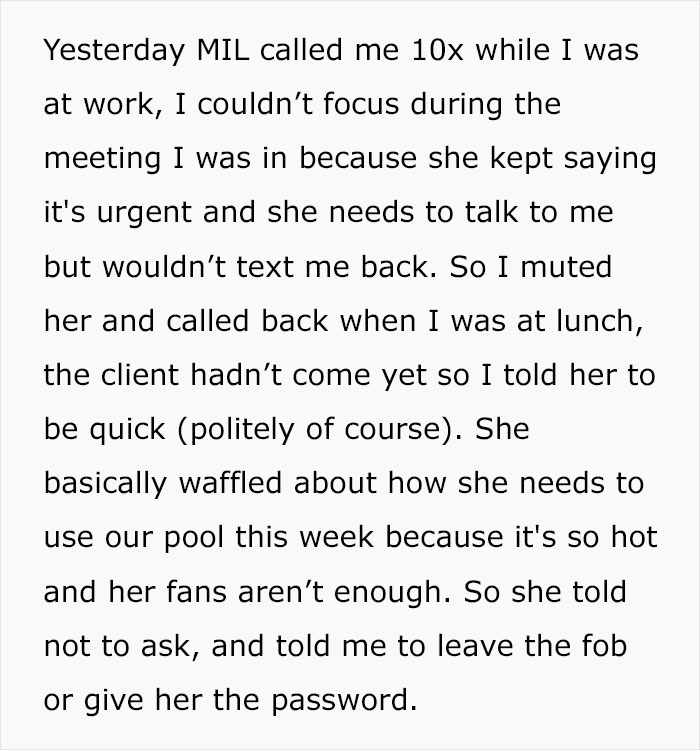




Boundaries are very important for healthy and happy relationships. They’re equally important in family situations, not just outside the home

Image credits: dvatri / envato (not the actual photo)
The fact that the author’s mother-in-law appears to have a love-hate relationship with hygiene is just the tip of the iceberg of awfulness.
Unfortunately, it gets a lot worse. The author of the viral story implied that her MIL doesn’t care about her and her husband’s privacy. What’s more, she is actively malicious.
“We know she’ll go into the house and go through our trash again or poke holes in our condoms,” the anonymous woman wrote, explaining why she doesn’t want to give her mother-in-law access to her home while nobody’s there.
Unfortunately, the author deleted her account, so we were unable to reach out to her for further comment.
Broaching topics like hygiene and showering with your loved ones can be challenging. Not to mention awkward. And embarrassing! But they’re a necessity if the person’s inability to care for themselves affects you.
To put it bluntly, if someone stubbornly refuses to shower for long stretches of time, they shouldn’t be surprised if their family and friends don’t want to spend a lot of time around them.
Some people simply lack the self-awareness to recognize that their behavior is problematic: they’re blind to the issue. Others might be aware of the problem but think that they’re in the right, no matter what.
In the first case, a few subtle hints (and if those don’t work, some overt ones) about their lack of hygiene might help them change their perspective. In the latter case, however, there’s no getting around the fact that you’ll need to clearly communicate some healthy boundaries… and then enforce them if the person continuously ignores them.
In this particular case, those boundaries might include things like not inviting the person over for dinner or family gatherings if they’re disruptive, rude, and refuse to shower. We’re talking about grownups, not teenagers, and they should know better. Yet, here we are.
Ignoring issues won’t magically make things better. It’s best to look for a solution

Image credits: Burst / pexels (not the actual photo)
Dr. Ruth explains in Time magazine that if there’s a hygiene issue, the worst thing you can do is to say nothing to your loved one.
Avoiding the problem can lead to further issues down the line. Moreover, it can negatively affect the entire relationship.
If subtle hints don’t do the trick, you can always try putting your words on paper. Write the other person a note. Be as gentle and diplomatic as you can. Use positive reinforcement. But don’t shy away from alluding to the problem either.
In this case, the other person will either make the necessary adjustments. Or they’ll end up having a conversation about the issue with you. Again, it’s entirely possible that the person isn’t aware that they have problematic hygiene.
If you do end up having a conversation about hygiene, privacy, or whatever else you care about, try not to sound as though you’re accusing the other person. You want to use lots of “I” statements about how their behavior affects you and makes you feel.
The less defensive they get, the more open they’ll be to change and compromise. And if they’re not, well, you’ll end up having to reevaluate your relationship with the person. Maybe spending less time around them is the right decision. At least for a little while.
According to Swim Right Academy, when you shower before swimming in the pool, you bring fewer impurities (body oils, sweat, etc.) into the water. That, in turn, allows the chlorine in the water to more effectively keep the pool clean.
Furthermore, if you shower right before getting into the pool, this minimizes your skin and hair’s exposure to chlorine.
It’s also important to shower after your swim! That way, you’ll rinse off any chlorine (and other pool chemicals), protecting your skin and hair.
What do you think of the way that the author of the post dealt with her mother-in-law? How would you have handled things if you were in her position? Have you ever had to deal with toxic in-laws? Let us know in the comments.
Many internet users rushed to share their thoughts on the tense situation. Here’s their take on what needs to be done



